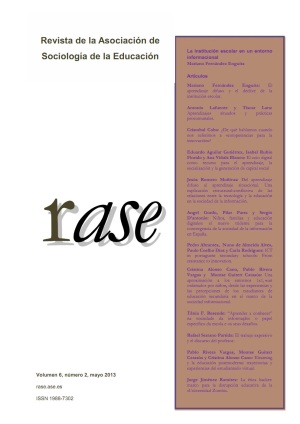From diffusive learning to situation learning. Structural- conflict an explanation of the relationship between technology and education in the information society
DOI:
https://doi.org/10.7203/RASE.6.2.8355Keywords:
technology and education, situational learning, diffusive learning, sociology of technology, technocracy, conflict approach. Abstract
Abstract
This article aims to think of education and technology relations from a structural and conflict approach. The first section broadly outlines the most important features of what I call the new technocratic version of education, and I reject the claim of unidirectional causal relationships between technological artifacts and the different educational fields. The new technocratic version is based on two theoretical mistakes: (a) an incorrect understanding of technology and society relations, and (b) insufficient consideration for the autonomy of the educational system as a source of segregation (via status or credentials). These mistakes are considered in the second and third sections respectively. Then, the fourth section introduces the concept of "situational learning" (in relation to Fernández-Enguita‘s "diffuse learning") as a third type of knowledge, between the common one of everyday life and the segregated one (source of status and credentials). Finally, the last section shows that the special circumstances that are occurring in the Information Society regarding the relationship between technology and education should be conceived not in a simple and dichotomous way, but as a network of struggles and conflicting possibilities among the three types of knowledge and the different socio-technical arrangements (including technological networks types and ways of teachinglearning organization, as well as cultural values and legal standard).
 Downloads
Downloads
Downloads
Published
How to Cite
-
Abstract1124
-
PDF (Español)234
Issue
Section
License
![]()
This work is licensed under a Creative Commons Reconocimiento-NoComercial-CompartirIgual 4.0 Internacional.




